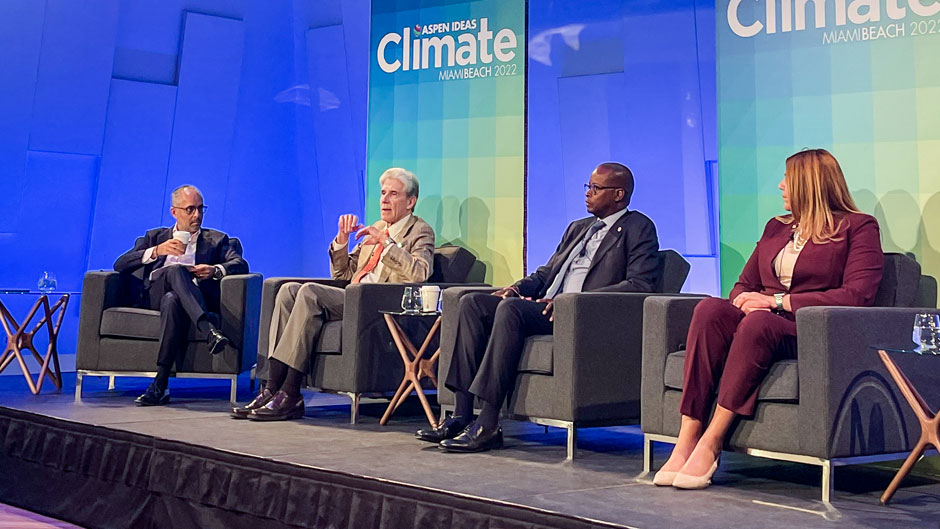University of Miami President Julio Frenk and other university leaders explored how colleges can enact bold and innovative action—just as they have done during the pandemic—to address the climate crisis, as part of a panel discussion at the four-day Aspen Ideas: Climate Conference on Miami Beach.
To address the urgency of the pandemic, universities scaled research, innovation, testing, public health delivery, and other facets of their operations, and the Tuesday session “Launching the Next Generation of Solutions: Higher Education’s Role in the Climate Crisis,” investigated how that same bold and robust response could be sustained to address the climate crisis.
“Universities have a key and indispensable role [in addressing the climate crisis] by breaking down silos and building structures and procedures whereby we produce an interdisciplinary problem-based approach to education and scientific research, one that broadens scholarship and inquiry all around one problem,” said Frenk, a global public health expert.
“It is an all-hands-on-deck effort, just as we did and continue to do with the pandemic, and this is exactly why we recently launched our Climate Resilience Academy,” noted Frenk, who described that initiative as “a functional unit meant to bring together all the assets the U has been building for years and future assets we will develop around the issue of climate resilience.”
Frenk appeared as part of the panel with Dan Porterfield, president and CEO, Aspen Institute; Wayne Frederick, president, Howard University; and Madeline Pumariega, president, Miami Dade College. The morning session held at the New World Center was moderated by Andre Dua of McKinsey & Company.
Frenk said that when he arrived at the University in 2015, he was told during listening tours that climate change was the number one issue affecting the community.
“It’s obvious that we’re at ground zero for so many of these issues—extreme heat and weather, sea level rise, flooding and more,” Frenk said. “And we must fulfill our unique institutional role of convening and using reason and inquiry to help turn the anger [that some people feel concerning the inadequate response] into constructive engagement.”
The president highlighted the efforts of the Laboratory for Integrated Knowledge (U-LINK), a University funding mechanism that seeks to generate creative solutions that will prosper with additional funding from community partners. Most of the dozens of projects relate to issues of climate change and resilience, he noted.
Pumariega, who through the community college’s system presides over about 120,000 students, urged universities to lean on the trust and leadership that they enjoy to model what society can do.
“If you connect back to the pandemic, at MDC we vaccinated over 400,000 people. People ask how we did that, and it’s because of our trust factor in the community,” Pumariega said. “Climate has that same parallel, and we have to lead in the same way. We have to have that same kind of boldness that reduced the time that task forces and committees met before from months to minutes.”
Porterfield described the three institutions represented on the panel as “rocket ships” and highlighted the “authenticity” of their efforts to advance research, understanding, education, and action relating to climate change.
He noted that Miami Dade College was the winner of the 2019 Aspen Prize for College Excellence, the nation’s signature recognition of high achievement and performance among state colleges. He also highlighted the Aspen Institute’s partnership with the University of Miami through its American Talent Initiative, which brings colleges and universities together with the philanthropy and research communities in order to expand access and opportunity for talented low- and moderate-income students.
Lisa Beal, professor of oceanography in the ocean sciences department at the Rosenstiel School of Marine and Atmospheric Science, questioned how universities might practice internally, on their campuses and in their operations, “what we ask society to do.”
“We need to be the models of sustainability,” Frenk said, “models for respectful debate and dialogue, and to reclaim our fundamental institutional role as an indispensable launchpad for big ideas and cutting-edge research, as well as a place for the next generation to explore their roles in the world.”
The annual Aspen Ideas Climate Conference, which concludes Thursday, convenes inspiring leaders and thinkers from around the world to debate and discover solutions relating to climate change.

